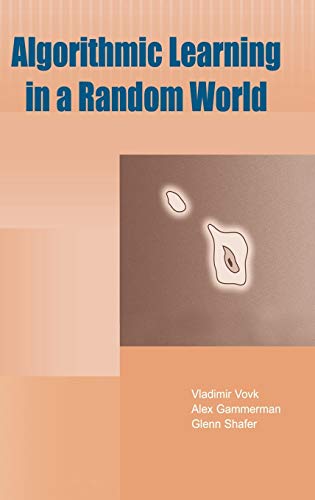Artículos relacionados a Algorithmic Learning in a Random World

Sinopsis
Algorithmic Learning in a Random World describes recent theoretical and experimental developments in building computable approximations to Kolmogorov's algorithmic notion of randomness. Based on these approximations, a new set of machine learning algorithms have been developed that can be used to make predictions and to estimate their confidence and credibility in high-dimensional spaces under the usual assumption that the data are independent and identically distributed (assumption of randomness). Another aim of this unique monograph is to outline some limits of predictions: The approach based on algorithmic theory of randomness allows for the proof of impossibility of prediction in certain situations. The book describes how several important machine learning problems, such as density estimation in high-dimensional spaces, cannot be solved if the only assumption is randomness.
"Sinopsis" puede pertenecer a otra edición de este libro.
De la contraportada
Conformal prediction is a valuable new method of machine learning. Conformal predictors are among the most accurate methods of machine learning, and unlike other state-of-the-art methods, they provide information about their own accuracy and reliability.
This new monograph integrates mathematical theory and revealing experimental work. It demonstrates mathematically the validity of the reliability claimed by conformal predictors when they are applied to independent and identically distributed data, and it confirms experimentally that the accuracy is sufficient for many practical problems. Later chapters generalize these results to models called repetitive structures, which originate in the algorithmic theory of randomness and statistical physics. The approach is flexible enough to incorporate most existing methods of machine learning, including newer methods such as boosting and support vector machines and older methods such as nearest neighbors and the bootstrap.
Topics and Features:
* Describes how conformal predictors yield accurate and reliable predictions, complemented with quantitative measures of their accuracy and reliability
* Handles both classification and regression problems
* Explains how to apply the new algorithms to real-world data sets
* Demonstrates the infeasibility of some standard prediction tasks
* Explains connections with Kolmogorov's algorithmic randomness, recent work in machine learning, and older work in statistics
* Develops new methods of probability forecasting and shows how to use them for prediction in causal networks
Researchers in computer science, statistics, and artificial intelligence will find the book an authoritative and rigorous treatment of someof the most promising new developments in machine learning. Practitioners and students in all areas of research that use quantitative prediction or machine learning will learn about important new methods.
"Sobre este título" puede pertenecer a otra edición de este libro.
EUR 9,83 gastos de envío desde Estados Unidos de America a España
Destinos, gastos y plazos de envíoComprar nuevo
Ver este artículoEUR 37,64 gastos de envío desde Estados Unidos de America a España
Destinos, gastos y plazos de envíoResultados de la búsqueda para Algorithmic Learning in a Random World
Algorithmic Learning in a Random World
Librería: ThriftBooks-Dallas, Dallas, TX, Estados Unidos de America
Hardcover. Condición: Very Good. No Jacket. May have limited writing in cover pages. Pages are unmarked. ~ ThriftBooks: Read More, Spend Less 1.53. Nº de ref. del artículo: G0387001522I4N00
Cantidad disponible: 1 disponibles
Algorithmic Learning in a Random World
Librería: BennettBooksLtd, North Las Vegas, NV, Estados Unidos de America
hardcover. Condición: New. In shrink wrap. Looks like an interesting title! Nº de ref. del artículo: Q-0387001522
Cantidad disponible: 1 disponibles
Algorithmic Learning in a Random World
Librería: Ria Christie Collections, Uxbridge, Reino Unido
Condición: New. In. Nº de ref. del artículo: ria9780387001524_new
Cantidad disponible: Más de 20 disponibles
Algorithmic Learning In A Random World
Librería: GreatBookPricesUK, Woodford Green, Reino Unido
Condición: New. Nº de ref. del artículo: 1694268-n
Cantidad disponible: Más de 20 disponibles
Algorithmic Learning In A Random World
Librería: GreatBookPrices, Columbia, MD, Estados Unidos de America
Condición: New. Nº de ref. del artículo: 1694268-n
Cantidad disponible: Más de 20 disponibles
Algorithmic Learning in a Random World
Librería: Best Price, Torrance, CA, Estados Unidos de America
Condición: New. SUPER FAST SHIPPING. Nº de ref. del artículo: 9780387001524
Cantidad disponible: 1 disponibles
Algorithmic Learning In A Random World
Librería: GreatBookPrices, Columbia, MD, Estados Unidos de America
Condición: As New. Unread book in perfect condition. Nº de ref. del artículo: 1694268
Cantidad disponible: Más de 20 disponibles
Algorithmic Learning In A Random World
Librería: GreatBookPricesUK, Woodford Green, Reino Unido
Condición: As New. Unread book in perfect condition. Nº de ref. del artículo: 1694268
Cantidad disponible: Más de 20 disponibles
Algorithmic Learning in a Random World
Librería: moluna, Greven, Alemania
Condición: New. About conformal prediction, which is a valuable new method of machine learningConformal predictors are among the most accurate methods of machine learning, and unlike other state-of-the-art methods, they provide information about their own accurac. Nº de ref. del artículo: 5908815
Cantidad disponible: Más de 20 disponibles
Algorithmic Learning in a Random World
Librería: Lucky's Textbooks, Dallas, TX, Estados Unidos de America
Condición: New. Nº de ref. del artículo: ABLIING23Feb2215580170529
Cantidad disponible: Más de 20 disponibles

